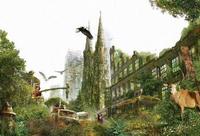 I've read similar things before, and it always puts our civilization a bit in perspective. Science writer Alan Weisman has written a book called "The World without Us", and Scientific American has an article: I've read similar things before, and it always puts our civilization a bit in perspective. Science writer Alan Weisman has written a book called "The World without Us", and Scientific American has an article:According to Weisman, large parts of our physical infrastructure would begin to crumble almost immediately. Without street cleaners and road crews, our grand boulevards and superhighways would start to crack and buckle in a matter of months. Over the following decades many houses and office buildings would collapse, but some ordinary items would resist decay for an extraordinarily long time. Stainless-steel pots, for example, could last for millennia, especially if they were buried in the weed-covered mounds that used to be our kitchens. And certain common plastics might remain intact for hundreds of thousands of years; they would not break down until microbes evolved the ability to consume them. It is an interview too. Here's a tidbit: Q: If human beings were to disappear tomorrow, the magnificent skyline of Manhattan would not long survive them. Weisman describes how the concrete jungle of New York City would revert to a real forest.
A: “What would happen to all of our stuff if we weren’t here anymore? Could nature wipe out all of our traces? Are there some things that we’ve made that are indestructible or indelible? Could nature, for example, take New York City back to the forest that was there when Henry Hudson first saw it in 1609?
“I had a fascinating time talking to engineers and maintenance people in New York City about what it takes to hold off nature. I discovered that our huge, imposing, overwhelming infrastructures that seem so monumental and indestructible are actually these fairly fragile concepts that continue to function and exist thanks to a few human beings on whom all of us really depend. The name ‘Manhattan’ comes from an Indian term referring to hills. It used to be a very hilly island. Of course, the region was eventually flattened to have a grid of streets imposed on it. Around those hills there used to flow about 40 different streams, and there were numerous springs all over Manhattan island. What happened to all that water? There’s still just as much rainfall as ever on Manhattan, but the water has now been suppressed. It’s underground. Some of it runs through the sewage system, but a sewage system is never as efficient as nature in wicking away water. So there is a lot of groundwater rushing around underneath, trying to get out. Even on a clear, sunny day, the people who keep the subway going have to pump 13 million gallons of water away. Otherwise the tunnels will start to flood." There's something strangely fascinating about the vision of nature taking over after humanity disappears. An overgrown New York, again having hills and streams, and the Statue of Liberty's torch sticking out of a beach somewhere. I can't quite decide which side I'm on, nature's or ours. But I hope it won't keep being a matter of sides, and that we'll work it out in more harmonious ways.
[ Culture | 2007-07-05 23:30 | | PermaLink ] More >
|
 I've read similar things before, and it always puts our civilization a bit in perspective. Science writer Alan Weisman has written a book called "The World without Us", and Scientific American has an article:
I've read similar things before, and it always puts our civilization a bit in perspective. Science writer Alan Weisman has written a book called "The World without Us", and Scientific American has an article: